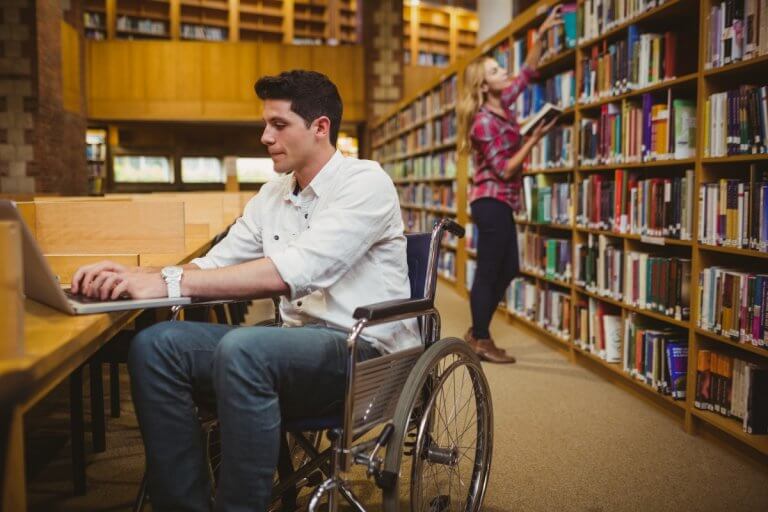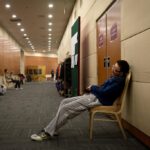
When it comes to selecting a university, international students normally make their selection based on rankings, academic reputation, diversity, cost, etc.
Learners with disabilities must also factor in the accessibility of the campus, as well as the services provided to give them the best possible quality of life.
It can be a particularly overwhelming time for international students with disabilities due to the fact they need to travel abroad and might not have the chance to check out the campus before arriving.
But that shouldn’t stop them from getting the education and college experience they deserve.
Several universities in the US recognise the need to provide assistance and services to the disabled, accommodating both those who are physically-disabled as well as those with learning disorders.
They have centres dedicated to their welfare, which recruit student volunteers to become note-takers or readers, or help them find accommodation tailored to their needs.
Here are the five of the most disabled-friendly universities in the US:

Student Dana Mathewson hits the gym at the adaptive fitness centre at the University of Arizona. Source: UA News
The University of Arizona has made efforts to make its campus accessible to disabled students, including a special fitness centre.
The unique, adaptive fitness centre has a variety of equipment designed to be easily accessible for wheelchair-users. It falls under the Adapative Athletics department which offers scholarships to promising student athletes with disabilities.
On the website, it states “Over the past 42 years, we have helped hundreds of disabled individuals graduate with a college degree and reach the highest level of athletic performance – competing in the Paralympics – because we were able to provide athletes with the equipment, facilities and resources necessary to succeed. ”
The Disability Resources Center (DRC) also helps students find housing and services that will best fit their needs.
Other services provided by the DRC include accessible transportation and exam administration needs for disabled students.
Indiana University Bloomington

Members of the Adaptive Sport Programme play a game of pick-up basketball. Source: News at IU Bloomington
Though the university has a long history, having been founded in 1820, it has made several efforts to upgrade its historic campus to assist disabled students.
Besides installing wheelchair-accessible ramps and wheelchair-designed seating areas, the university also operates 27 buses that are equipped with accessibility features.
In its older buildings where elevator installation isn’t possible, stairway lifts have been added to accommodate those in wheelchairs.
Other services provided by the Disability Services for Students (DSS) at the university include accomodation arrangements and exam modifications such as the use of assistive technology.
There are also service animals available for those who qualify, and an Adaptive Sports Programme.

Student Brad Ebenhoeh tests a variety of assistive software at the University of Michigan. Source: The Michigan Engineer News Center
This university is a pioneer for advocating for students with disabilities. The Services for Students with Disabilities (SSD) was the first in the country to establish an adaptive technology computing lab, as well as a fund (a joint effort with the Provost’s office) to support mandated accommodations.
The fund was the first of its kind at the time, fast becoming a model for several other universities in the nation who soon followed suit.
The James Edward Knox Center Adaptive Technology Computing Site (Knox Center) is a quiet and accessible computing site for students registered with the Office of Services for Students with Disabilities (SSD), designed to meet the IT needs of people with disabilities.
It includes specialised hardware and software at multiple Windows and Macintosh computers, all of which have 21″ or larger high-resolution monitors and adjustable-height workstations to accommodate wheelchairs, as well as speech-recognition software.
Other services include speech-to-text services and academic coaching for students with disabilities.
University of Illinois at Urbana-Champaign

The Disability Resources and Educational Services (DRES) provide plenty of services, including counselling. Source: DRES Facebook page
This university is also home to an adaptive athletics programme where many alumni have gone on to win gold medals in Paralympic events.
Furthermore, it offers extensive help and assistance to students registered for Disability Resources and Educational Services (DRES).
Assistive technologies have been incorporated in several of its campus workstations, such as assistive software, large monitor screens, and accessible ‘routes’ to workstations so students in wheelchairs can manoeuvre comfortably within the libraries and labs.
For the past 20 years, the DRES has also been providing accommodations and comprehensive support services to students with autism spectrum disorders for the past 20 years.
They also provide academic coaching, individual therapy, group therapy, social skills and career services, and serve as consultants with faculty, departments and housing to provide recommendations for accommodations for unique classroom requirements or problem behaviors.
University of California at Berkeley

A ramp at the UC Burkeley campus. Source: Berkeley Campus Access Services
UC Berkeley assists students with special needs with everything they require, from finding appropriate housing to helping with route planning.
Part of the RiO-S3 program, a federal programme that works in conjunction with the Disabled Students Program (DSP), this school also provides mentors, counseling, tutors and financial assistance to students to help them adjust to university life and succeed academically as well as socially.
They also provide accessible furniture for students in the classroom, such as detached tables and chairs whereby armrests can be removed upon need, standing lecterns, and adjustable height tables.
The department also helps students with accessibility needs when they want to attend events by providing walkthroughs and making sure they are equipped to accommodate them.







